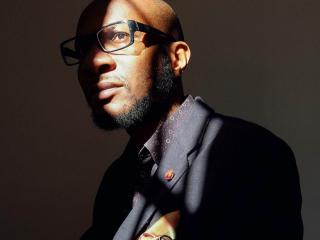Paul Beatty, the Booker Prize Winning Author of "The Sellout" recommends "The Nazi and the Barber," a novel by Holocaust survivor Edgar Hilsenrath. More
Arts and Culture
Talking about race is fraught these days, so it took guts for Paul Beatty to write his novel "The Sellout." It's a satire about a young black man who winds up on trial at the Supreme Court. And along the way, he enslaves an old friend and re-segregates the local high school.More
Sometimes you stumble upon a book that sets you on a whole new path. For Israeli historian and philosopher Yuval Noah Harari — author of "Sapiens," "Homo Deus," and "21 Lessons for the 21st Century" — it wasn’t a novel, a memoir, or even a history book that changed his world. It was a book about chimpanzees.More
The main character in Jeff VanderMeer’s other-worldly tale is a polymorphous bear who moves in magical and unexpected ways, and keeps secrets in his fur. It’s both a futuristic story and one with deep history, the kind of dystopian fiction that drew Yuknavitch in, again, and again.More
The author of "Lincoln in the Bardo" recommends Victor Klemperer's two-volume diary that reads as a slow-motion picture of what the Holocaust looked like before it was known Holocaust.More
Jean Rhys takes up a "mad" wife’s story in "Wide Sargasso Sea," an overlooked novel recommended by "Handmaid’s Tale" author Margaret Atwood.More
Piers Vitebsky is an anthropologist who studies the Eveny — also known as the "Reindeer People of Siberia." He tells Steve Paulson they keep herds of reindeer for meat, but also have personal, consecrated reindeer animal doubles, which they believe will die for them.More
Lucy Jane Bledsoe is a novelist who's made three trips to Antarctica as part of the National Science Foundation's Artists and Writers in Antarctica Program. She tells Anne Strainchamps that the place is addictive.More
Teju Cole grew up in Nigeria and then moved to U.S., joining millions of others in the African diaspora. He became an acclaimed novelist and photographer, and now celebrates the cosmopolitan culture of global cities, including Lagos and New York.More
Writer Lorrie Moore says Alice Munro’s book of short stories, "Carried Away," shows mastery of the architecture of the short story that is both brilliant and can’t be imitated.More
Dagmawi Woubshet and Julie Mehretu were both born in Addis Ababa and then moved to America. They wonder what the city's explosive growth will mean for its unique character — one rooted in Ethiopia's history as the only African nation never colonized.More
The families of Dagmawi Woubshet and Julie Mehretu fled Ethiopia because of the brutal Communist regime that overthrew Emperor Haile Selassie. The violence and corruption in the post-colonial era decimated the hope and idealism of many Africans.More
In Addis Ababa, curator Meskerem Assegued and artist Elias Sime have created Zoma Museum as a visionary model of an urban future, using ancient Ethiopian building techniques. They say modern development can be much more than concrete high-rises.More
Journalist Anand Giridharadas says that sometimes, major philanthropic gifts are a lot less altruistic than they may appear.More
Psychologist Elizabeth Dunn on how to spend money on ourselves and others in a way that maximizes happiness.More
Filmmaker Werner Herzog, whose films include "Grizzly Man" and "Cave of the Forgotten Dreams," recommends a nonfiction collection of J.A. Baker's observations of peregrine falcons, recorded in the early 1960s.More
Martin Amis has written his fair share of novels and essay collections. For a writer, you expect their favorite books to be a source of inspiration. For Amis, Saul Bellow's 1953 novel is a source of writer's block.More
Young people seem to be feeling the pressure to be perfect more than anyone else. Social psychologist Tom Curran tells us how neoliberalism and the digital age created a generation that feels guilty about falling short of flawlessness.More


















